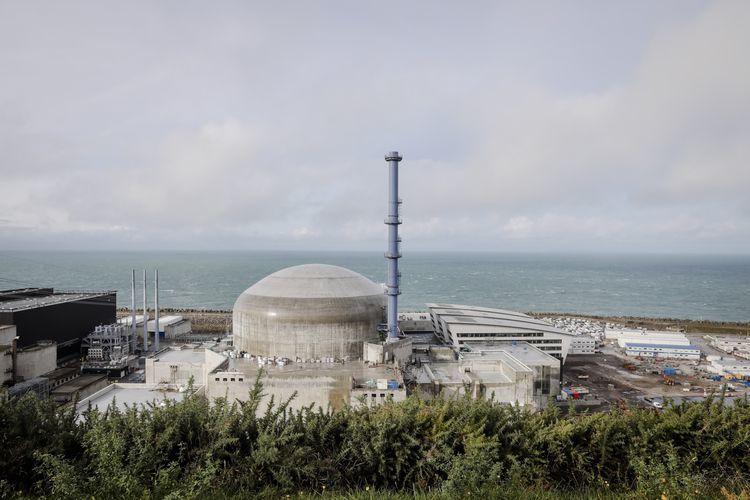
French presidential favorite Emmanuel Macron may have to break a campaign pledge over the speed at which France reduces its dependence on nuclear power.
Macron, who topped the first round of voting in Sunday’s presidential election, has endorsed President Francois Hollande’s plan to reduce nuclear output from 72 percent of France’s total electricity generation last year to 50 percent by around 2025. There’s increasing speculation that goal may be unattainable.
The 50% target might be reached between 2030 and 2033, according to a Macron adviser who asked not to be named because the matter isn’t public. That objective could be reached sooner should technical issues impact EDF’s reactors and France’s nuclear watchdog impose tough conditions on extending those plants’ lifespans to at least 50 years, the person said.
The election runoff on May 7 pits Macron against National Front candidate Marine Le Pen, who supports nuclear power and wants to halt wind-turbine installations. Macron is backing a shift toward renewables, even as state-controlled utility Electricite de France SA pushes a 48 billion-euro ($52.2 billion) program to extend the lifespan of most of its 58 atomic reactors. Whoever wins will shape the pace of France’s energy transition, both through state incentives for renewables and financing for the next round of nuclear investment.
Ahmed Farman, an analyst at Jefferies International Ltd., wrote in a research note: “The next president will soon have to decide on the long-term role of nuclear in France.
“The lack of a firm position on this issue may be because Mr. Macron is well aware that the 2025 target is highly ambitious.”
On Feb. 9, Macron told WWF France that he couldn’t say whether the 2025 goal was “reachable.” “Strategic decisions” on that fleet will be made toward the end of 2018 or beginning of 2019, once France’s safety authority outlines its conditions for approving the extension of reactors’ lifetime, the former investment banker said.
Macron is also backing a government plan to close the Fessenheim nuclear power plant when the Flamanville atomic reactor comes on line and to close the country’s remaining 3 gigawatts of coal-fired stations by the end of the next presidential mandate in 2022.
Renewable Expansion
To cut France’s reliance on atomic power over the next five years, Macron wants to double France’s solar and wind power capacities, which stood at 6.8 gigawatts and 11.7 gigawatts last year, partly by simplifying authorization processes. He pledged to launch tenders for 26 gigawatts of renewables by 2022, requiring private investment of 30 billion euros.
Macron would defeat Le Pen in the runoff by 59 percent of the vote to 41 percent, according to a daily rolling poll released by OpinionWay on Thursday.
To achieve Macron’s energy goal by 2025, France would need to cut nuclear capacity by about 25 gigawatts, while adding about 75 gigawatts of renewables, according to Farman at Jefferies. That looks “quite challenging,” he said.
EDF, which has been forced to sell assets and new shares to bolster a balance sheet undermined by falling electricity prices, has said it will have to decide at the start of the next decade whether to build new atomic plants by 2030 to replace older ones.
That will further stretch the finances of the utility — 83 percent owned by the French state — and the government will need to provide more funding and incentives to underpin investment in new capacity, said Vincent Ayral, an analyst at JPMorgan Chase & Co.
“It is not clear how the company will be able to keep the lights on over the long term,” Ayral wrote in a note on Monday. “Yet EDF is systemic to France and, to a certain extent, to Europe: we believe a regulatory intervention is needed.”
Attached Media